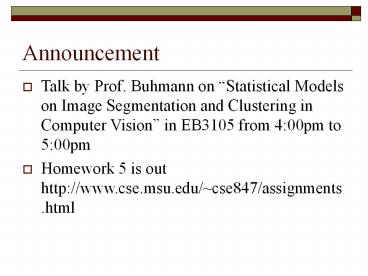Announcement - PowerPoint PPT Presentation
Title:
Announcement
Description:
Small model variance. Bagging ... classifier because it effectively reduces the model variance. single decision tree. Bagging decision tree. bias. variance ... – PowerPoint PPT presentation
Number of Views:45
Avg rating:3.0/5.0
Title: Announcement
1
Announcement
- Talk by Prof. Buhmann on Statistical Models on
Image Segmentation and Clustering in Computer
Vision in EB3105 from 400pm to 500pm - Homework 5 is out http//www.cse.msu.edu/cse847/a
ssignments.html
2
Bayesian Learning
- Rong Jin
3
Outline
- MAP learning vs. ML learning
- Minimum description length principle
- Bayes optimal classifier
- Bagging
4
Maximum Likelihood Learning (ML)
- Find the model that best explains the
observations by maximizing the log-likelihood of
the training data - Logistic regression
- Parameters are found by maximizing the likelihood
of training data
5
Maximum A Posterior Learning (MAP)
- In ML learning, models are determined solely by
the training examples - Very often, we have prior knowledge/preference
about parameters/models - ML learning doesnt incorporate the prior
knowledge/preference on parameters/models - Maximum a posterior learning (MAP)
- Knowledge/preference about parameters/models are
incorporated through a prior
6
Example Logistic Regression
- ML learning
- Prior knowledge/Preference
- No feature should dominate over all other
features - ? Prefer small weights
- Gaussian prior for parameters/models
7
Example (contd)
- MAP learning for logistic regression
- Compared to regularized logistic regression
8
Minimum Description Length Principle
- Occams razor prefer the simplest hypothesis
- Simplest hypothesis ? hypothesis with shortest
description length - Minimum description length
- Prefer shortest hypothesis
- LC (x) is the description length for message x
under coding scheme c
of bits to encode data D given h
of bits to encode hypothesis h
9
Minimum Description Length Principle
Receiver
Sender
Send only D ?
Send only h ?
D
Send h D/h ?
10
Example Decision Tree
- H decision trees, D training data labels
- LC1(h) is bits to describe tree h
- LC2(Dh) is bits to describe D given tree h
- Note LC2(Dh)0 if examples are classified
perfectly by h. - Only need to describe exceptions
- hMDL trades off tree size for training errors
11
MAP vs. MDL
- MAP learning
- Fact from information theory
- The optimal (shortest expected coding length)
code for an event with probability p is log2p - Interpret MAP using MDL principle
12
Problems with Maximum Approaches
- Consider
- Three possible hypotheses
- Maximum approaches will pick h1
- Given new instance x
- Maximum approaches will output
- However, is this most probably result?
13
Bayes Optimal Classifier (Bayesian Average)
- Bayes optimal classification
- Example
- The most probably class is -
14
When do We Need Bayesian Average?
- Bayes optimal classification
- When do we need Bayesian average?
- Multiple mode case
- Optimal mode is flat
- When NOT Bayesian Average?
- Cant estimate Pr(hD) accurately
15
Computational Issues with Bayes Optimal Classifier
- Bayes optimal classification
- Computational issues
- Need to sum over all possible models/hypotheses h
- It is expensive or impossible when the
model/hypothesis space is large - Example decision tree
- Solution sampling !
16
Gibbs Classifier
- Gibbs algorithm
- Choose one hypothesis at random, according to
P(hD) - Use this to classify new instance
- Surprising fact
- Improve by sampling multiple hypotheses from
P(hD) and average their classification results - Markov chain Monte Carlo (MCMC) sampling
- Importance sampling
17
Bagging Classifiers
- In general, sampling from P(hD) is difficult
because - P(hD) is rather difficult to compute
- Example how to compute P(hD) for decision tree?
- P(hD) is impossible to compute for
non-probabilistic classifier such as SVM - P(hD) is extremely small when hypothesis space
is large - Bagging Classifiers
- Realize sampling P(hD) through a sampling of
training examples
18
Boostrap Sampling
- Bagging Boostrap aggregating
- Boostrap sampling given set D containing m
training examples - Create Di by drawing m examples at random with
replacement from D - Di expects to leave out about 0.37 of examples
from D
19
Bagging Algorithm
- Create k boostrap samples D1, D1,, Dk
- Train distinct classifier hi on each Di
- Classify new instance by classifier vote with
equal weights
20
Bagging ? Bayesian Average
21
Empirical Study of Bagging
- Bagging decision trees
- Boostrap 50 different samples from the original
training data - Learn a decision tree over each boostrap sample
- Predicate the class labels for test instances by
the majority vote of 50 decision trees - Bagging decision tree performances better than a
single decision tree
22
Bias-Variance Tradeoff
- Why Bagging works better than a single
classifier? - Bias-variance tradeoff
- Real value case
- Output y for x follows yf(x)?, ?N(0,?)
- ?(xD) is a predicator learned from training data
D - Bias-variance decomposition
23
Bias-Variance Tradeoff
24
Bias-Variance Tradeoff
25
Bagging
- Bagging performs better than a single classifier
because it effectively reduces the model variance
variance
bias
single decision tree
Bagging decision tree































